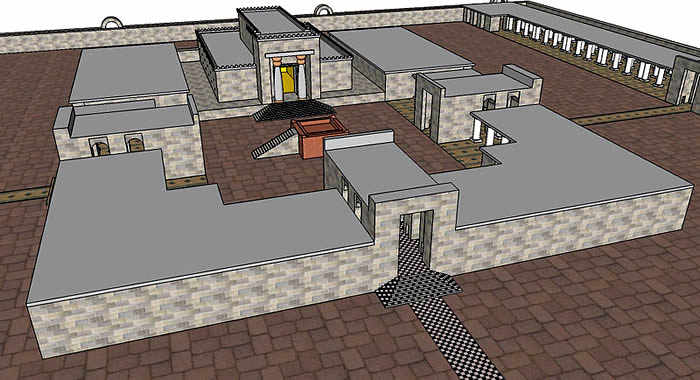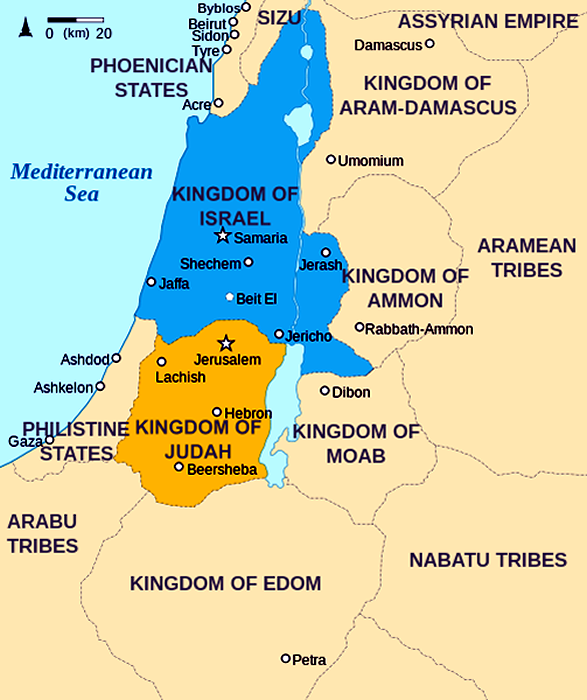 Israel and Judah
Israel and Judah

(Text by Duane R. Hurst © 2013)
Click on a link to view its information and pictures.
|
ISRAEL/JUDAH LINKS: Significant Event: Destruction of Jericho Exodus/Commandments Solomon Builds Temple Main Cities: Jerusalem; Jericho; Samaria Time: 1400 BC - 70 AD Language: Canaanite; Hebrew Personage: David; Solomon; Zedekiah Religion: Judaism; Molech Related Country: Israel; West Bank Brief History: I have included only a few items concerning the history of these kingdoms. A good source for more details can be found on Wikipedia or in history books. |
|
|
EARLY YEARS:
Israelites under the direction of Moses made an exodus from ancient Egypt into the land of Canaan. Moses encouraged his people during the Battle of Rephidim against the Amalekites. Israelites later crossed the Jordan River and conquered cities such as Jericho and Ai. After Moses, Joshua and various judges guided the people until they demanded to have a king. Circa 1020 BC, the prophet Samuel said God selected Saul to be the first king, but was displeased with the Israelites' demand for a king. Saul built a palace at Gibeah and established his capital there. WARS WITH PHILISTINES: Philistine Soldiers often clashed with inexperienced troops of early Israel during the 10th through 7th centuries BC, such as the Battle of Shephelah. The two most famous combatants against Philistine soldiers were: 1) Samson killing 1,000 men and destroying a temple; 2) David killing Goliath. Philistine troops defeated Israelites in battle at Eben-Ezer (probably at modern Beit Iksa) and captured their Ark of the Covenant. It was briefly housed in succession at Ashdod, Gath and Ekron. At each location the people suffered from a plague until the Philistines returned the Ark to Israel. Circa 1010 BC, Philistine troops defeated and killed Saul in the Battle of Mount Gilboa. KINGDOM OF ISRAEL: King David (1000-961 BC) reigned after the the death of Saul. Israel experienced a "Golden Age" during his reign and that of his son, Solomon. He made Jerusalem the capital in 1006 BC. The unified kingdom became a regional power after David's army defeated the Philistines and secured all borders. David earned God's punishment for arranging the death of his Captain of the Guard, Uriah, and marrying Bathsheba. Israel expanded to its greatest extent under Solomon, (970-931 BC). The Queen of Sheba made a state visit due to his renowned great wisdom and wealth. Solomon also built the first permanent temple in Jerusalem. Despite having 700 wives and 300 concubines, Solomon came under condemnation for adopting idolatry. A DIVIDED KINGDOM: In 931 BC, Solomon died and his son, Rehoboam, became king over a divided kingdom. Ten of the twelve tribes refused to accept him and formed the Northern Kingdom of Israel (930-720 BC). The tribes selected Jeroboam as king in their capital at Samaria. The remaining two tribes under Rehoboam comprised the Kingdom of Judah, with its capital at Jerusalem. Various small Kingdoms surrounded the split Israelite kingdoms of Israel and Judah. FALL OF NORTHERN ISRAEL: Israel and Judah engaged in frequent warfare during the first 60 years of the split. The following 80 years were peaceful alliance against common enemies, such as Damascus. In 738 BC, Assyrian forces invaded Israel and besieged Samaria in 725 BC. But in 722 BC Sargon II became king and completed the siege of Samaria. He took 27,000 Israelites into captivity, who later were called the Ten Lost Tribes. They subsequently received permission to wander into uncharted northern lands and were lost to history. CAPTIVITY OF JUDAH: King Jeconiah (aka Jehoicachin) of Judah foolishly relied upon Egypt and revolted against Nebuchadnezzar II. After an 18-month siege in 597 BC, Jerusalem fell and three thousand captives were taken to Babylon. Chaldean troops also destroyed Solomon's temple. In 539 BC, a Persian force under King Cyrus conquered Babylon. He allowed the Jewish exiles to return and rebuild the temple in Jerusalem. This was completed in 515 BC under the direction of Zerubbabel. However, the former Kingdom of Judah remained subservient to a plethora of subsequent empires, such as Alexander and Rome. |
|
|
© Page Publisher: Duane R. Hurst
|


